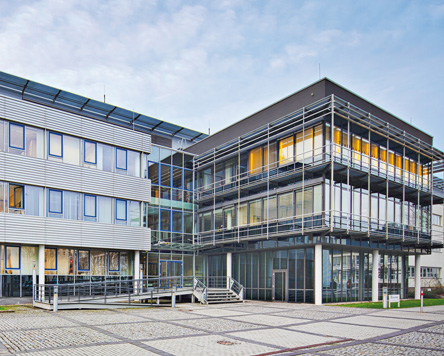The Fraunhofer Institute for Manufacturing Technology and Advanced Materials IFAM – founded in 1968 and part of the Fraunhofer Society since 1974 – is now one of Europe's leading independent research institutions for adhesive bonding technology, surfaces, shaping, and functional materials. At seven locations – Bremen, Dresden, Stade, Wolfsburg, Braunschweig, Helgoland, and Cuxhaven – around 700 employees work toward a single goal: practical solutions that quickly find their way into industrial applications.
Our portfolio addresses key future industries such as mobility, energy, aviation, maritime technologies as well as medical technology and life sciences. In addition, mechanical and plant engineering, electronics and electrical engineering, shipbuilding and rail vehicle construction, or the packaging and construction industries also benefit from our developments. Our work is based on seven closely interlinked core areas of expertise: metallic and polymer materials, surface technology, adhesive bonding, shaping and component manufacturing, energy storage and conversion, and automation and robotics. These enable us to cover the entire value chain: from material development and product design to pilot production, quality assurance, and integration into production processes.
In detail, the spectrum of our contract research ranges from materials, shaping, and joining technology to the functionalization of surfaces, the development of complete components or complex components and systems, as well as current issues relating to digital transformation and its practical implementation. Fraunhofer IFAM covers the entire value chain from material development and product design to integration into industrial manufacturing. At the same time, we strengthen the industry's expertise through certified continuing education in adhesive bonding technology, fiber composites, and electric mobility, so that new technologies can be quickly and safely put into practice.
Our goal is clear: to create innovations that are ecologically sound, economically viable, and socially valuable. That is what we stand for – today and in the future.
Research on energy storage
Based on its many years of expertise in powder technology, interface research, polymer chemistry, and electrical energy storage, the development of solid-state batteries based on polymer and sulfide composites is a key research focus at Fraunhofer IFAM. In addition to questions regarding material selection, suitable process technologies for such battery cells on an industrial scale are also important.
In the field of chemical hydrogen storage, the institute is developing novel materials and their processing technologies as well as technical components for demand-oriented hydrogen production for fuel cell systems, which allow very high volumetric and gravimetric energy and power densities at low system pressures.
www.ifam.fraunhofer.de


